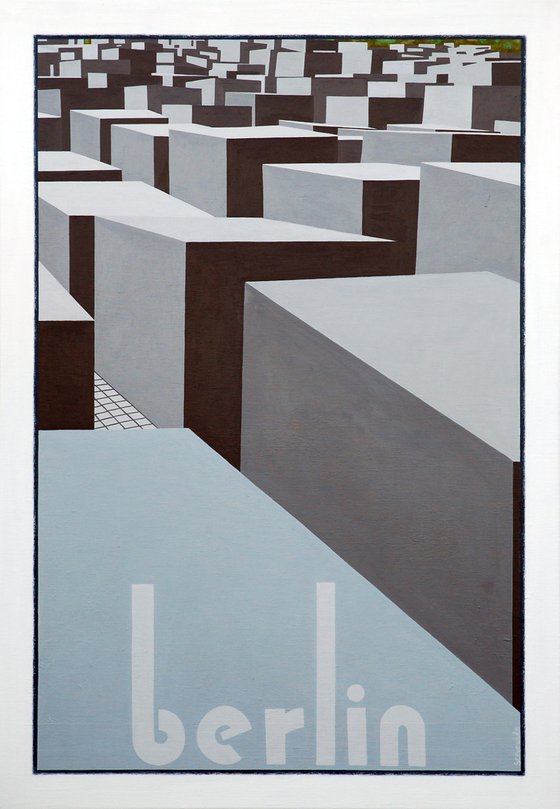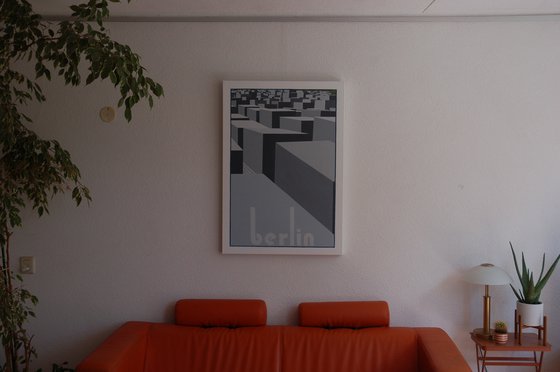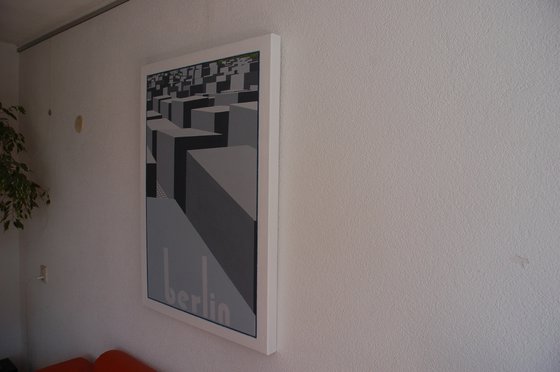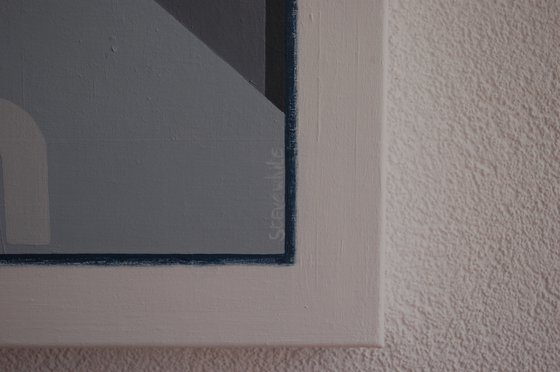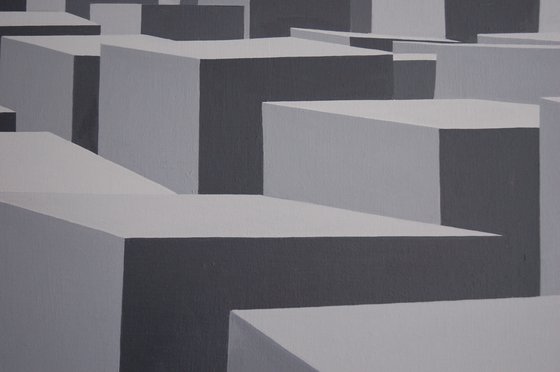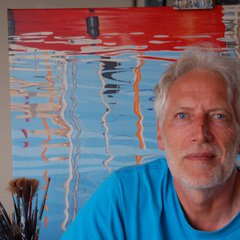- By medium
- By subject
- By budget
- Sales
- Gift cards
- Discover all art
- Artists
- Editors’ picks
- Ideas
Original artwork description:
If you have ever wandered through the Memorial To The Murdered Jews Of Europe (The Holocaust Memorial) in Berlin's Friedrichstadt district, you could be forgiven for thinking that you have strayed into a 3D cubist maze constructed by Georges Braque or Pablo Picasso.
The memorial comprises 2711 stark grey stelae (slabs) measuring 2.38 metres long, 0.95 metres wide, with height varying from 0.2-4.7m. The slabs are arranged in a defined grid over a dipping 4.7 acre site. The memorial, opened in May 2005, naturally invokes strong feelings. US architect/designer Peter Eisenman said that the slabs are meant to produce an 'uneasy, confusing atmosphere, and the whole sculpture aims to represent a supposedly ordered system that has lost touch with human reason.' Like the slabs, this is heavy stuff. Other interpretations of the memorial note the resemblance to coffins/a graveyard, and invoke feelings such as loss of identity, loss of family, of being trapped, of incompleteness, of segregation or, as Wolfgang Thierse, President of the German Bundestag said at the time 'of loneliness, powerlessness, despair.'
Artistically the stark repeated pattern of the slabs could well be something from the German Bauhaus school (1919-1933). Some Bauhaus designs favour geometric blocks of plain repeated colours. Chromatically the grey colour of the slabs also puts one in mind of another memorial to a dismal atrocity - Picasso's mostly grey painting commemorating the bombing of the Basque town of Guernica by the Nazis in 1937.
But had Picasso, or French artist Georges Braque, the two pioneers of Cubism, been alive they would no doubt have appreciated the cubist nature of the Memorial. Cubism aims to show all possible viewpoints of an object by way of cubes and other geometrical shapes. Painting a cubist version of a markedly cubist subject would surely have presented even Picasso a particular challenge. Indeed, it is fair to say that The Holocaust Memorial is an unlikely subject for a painting anyway. But it is an artistic monument. American abstract expressionist painter Ad Reinhardt became famous for his series of 'black paintings', which comprise paintings made up of grids of different shades of...er...black. Here at least there are many shades of grey, and, in the top right hand and left hand corners, the green trees of the Tiergarten are just visible, a sliver of hope.
Limited Edition Prints.
Printed on William Turner Hahnemuhle fine art exhibition quality paper (310 g/m2) using Epson Ultrachrome Pro Pigments, the colours remain true to the original up to 100 years.
The image size is 43×30 cms and there is an additional 3 cms border all the way round the image (ie total size: 49×36 cms). The artist will sign and number the print in this border. The print is unframed.
Prints will leave the artists studio within 7 days, rolled in a heavy tube, accompanied by a Certificate of Authenticity and sent via track and trace.
Materials used:
Acrylics
Tags:
#grey #berlin #poster #cubism #holocaust memorialHolocaust Memorial, Berlin (2020) Acrylic painting
by Steve White
2 Artist Reviews
£472.22
- Acrylic painting on Canvas
- One of a kind artwork
- Size: 70 x 100 x 4.5cm (unframed) / 70 x 100cm (actual image size)
- Ready to hang
- Signed on the front
- Style: Graphic
- Subject: Architecture and cityscapes
Loading
Original artwork description
If you have ever wandered through the Memorial To The Murdered Jews Of Europe (The Holocaust Memorial) in Berlin's Friedrichstadt district, you could be forgiven for thinking that you have strayed into a 3D cubist maze constructed by Georges Braque or Pablo Picasso.
The memorial comprises 2711 stark grey stelae (slabs) measuring 2.38 metres long, 0.95 metres wide, with height varying from 0.2-4.7m. The slabs are arranged in a defined grid over a dipping 4.7 acre site. The memorial, opened in May 2005, naturally invokes strong feelings. US architect/designer Peter Eisenman said that the slabs are meant to produce an 'uneasy, confusing atmosphere, and the whole sculpture aims to represent a supposedly ordered system that has lost touch with human reason.' Like the slabs, this is heavy stuff. Other interpretations of the memorial note the resemblance to coffins/a graveyard, and invoke feelings such as loss of identity, loss of family, of being trapped, of incompleteness, of segregation or, as Wolfgang Thierse, President of the German Bundestag said at the time 'of loneliness, powerlessness, despair.'
Artistically the stark repeated pattern of the slabs could well be something from the German Bauhaus school (1919-1933). Some Bauhaus designs favour geometric blocks of plain repeated colours. Chromatically the grey colour of the slabs also puts one in mind of another memorial to a dismal atrocity - Picasso's mostly grey painting commemorating the bombing of the Basque town of Guernica by the Nazis in 1937.
But had Picasso, or French artist Georges Braque, the two pioneers of Cubism, been alive they would no doubt have appreciated the cubist nature of the Memorial. Cubism aims to show all possible viewpoints of an object by way of cubes and other geometrical shapes. Painting a cubist version of a markedly cubist subject would surely have presented even Picasso a particular challenge. Indeed, it is fair to say that The Holocaust Memorial is an unlikely subject for a painting anyway. But it is an artistic monument. American abstract expressionist painter Ad Reinhardt became famous for his series of 'black paintings', which comprise paintings made up of grids of different shades of...er...black. Here at least there are many shades of grey, and, in the top right hand and left hand corners, the green trees of the Tiergarten are just visible, a sliver of hope.
Limited Edition Prints.
Printed on William Turner Hahnemuhle fine art exhibition quality paper (310 g/m2) using Epson Ultrachrome Pro Pigments, the colours remain true to the original up to 100 years.
The image size is 43×30 cms and there is an additional 3 cms border all the way round the image (ie total size: 49×36 cms). The artist will sign and number the print in this border. The print is unframed.
Prints will leave the artists studio within 7 days, rolled in a heavy tube, accompanied by a Certificate of Authenticity and sent via track and trace.
Materials used:
Acrylics
Tags:
#grey #berlin #poster #cubism #holocaust memorial14 day money back guaranteeLearn more
